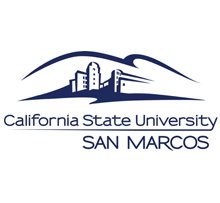California State University San Marcos

Founded in 1989 as the 20th California State University campus, CSU San Marcos (CSUSM) is a regional comprehensive university serving a growing student body of approximately 17,000 undergraduate and graduate (master’s-level) students. The Chemistry and Biochemistry Department at CSUSM offers programs of courses leading to a B.S. in Chemistry, a B.S. in Biochemistry, and a Chemistry Education option. The B.S. in Chemistry is accredited by the American Chemical Society Committee (ACS) on Professional Training. A broad spectrum of courses for majors are available in the traditional areas of analytical, inorganic, organic, physical and biochemistry. As an integral part of this program, each chemistry student is required to do a senior research project, thesis, and thesis defense. Also, each student will have the opportunity to specialize in their Degree in Chemistry/Biochemistry by taking upper division elective courses in analytical, inorganic, organic, physical or biochemistry. Our students are active in professional clubs, such as the ACS Student Affiliate Club and Chemistry and Biochemistry Pre-Grad Society, as well as outreach events such as SuperSTEM Saturday.
Chemistry B.S., Chemistry M.S.
Organic Chemistry, Faculty Research, Student Research, Student Chapter/Club Activities and/or Outreach
ACS Student Affiliate Club and Chemistry and Biochemistry Pre-Grad Society
Short term goals:
1) Establish Green Chemistry program student learning outcomes in the chemistry and biochemistry curriculum.
2) Incorporate toxicology into the curriculum (either stand-alone course or distributed in the curriculum).
3) Implement greener lab experiences for students in general chemistry, organic chemistry, biochemistry, and advanced labs while also incorporating the tenets within the traditional lecture material.
4) Initiate both undergraduate and graduate student research projects that directly relate to the tenets of Green Chemistry.
Long term goals:
1) Establish a “Green Chemistry minor” as a distinction for undergraduates who satisfy an appropriate set of requirements.
2) Establish a “Green Chemistry Certification” as a professional degree through our Extended Learning Program.
3) Propagate our initiative across the campus by collaborating with other departments/colleges (several longer term initiatives are in progress).
Green Chemistry Theory and Practice, by Paul Anastas and John Warner, Oxford University Press, 1998.
Beyond Benign Webinars
Green Chemistry Highlights in ACS Publications
